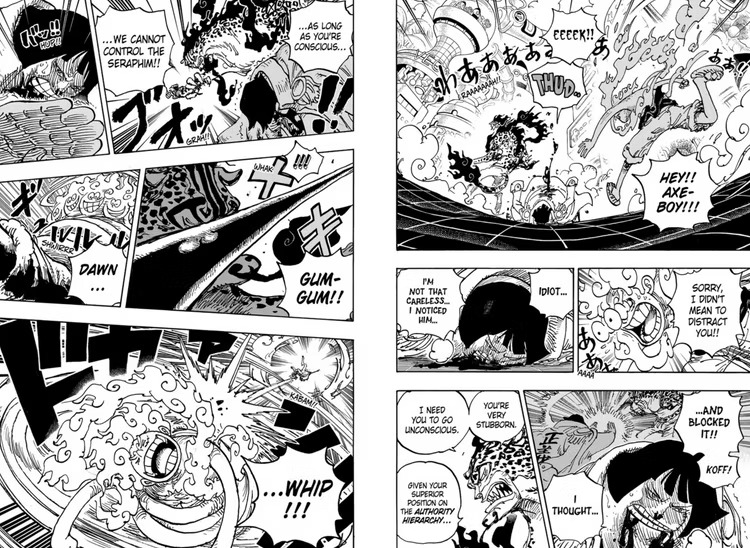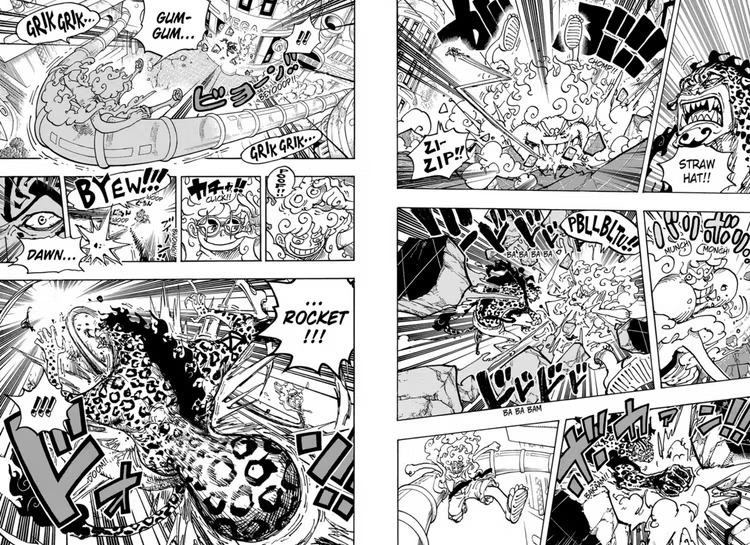Luffy’s Gear Five comes with a new naming system for his techniques. However, the meaning behind the new names is complicated by their wordplay.
Monkey D. Luffy uses different forms of his attacks depending on what form he’s in. In his base form, he names his attacks after weapons. In Gear Two, he introduced the “Jet” version of his attacks. Gear Three introduced the Gigant series. In Gear Four, his attacks are named after animals. Not all his attacks in these forms followed these naming formulas, but a lot of them did.
Now that Luffy has gained Gear Five, he’s also come up with a new naming system. In Chapter 1070 of One Piece, “The Strongest form of Humanity,” he introduced the “Dawn” series of attacks. At least, that’s what the Viz translation is calling them. Fan translators who read the raw scans of the manga may beg to differ. In any case, Luffy should have a new form for many of his old moves ready to try out.
Why Does Luffy Use “Dawn” For His Gear Five Attack Names?

Luffy unveiled his new attack series during his fight with Rob Lucci. First, he used the Gum-Gum Dawn Whip to deliver a spinning kick to the CP0 agent; this also caused him to spin out of control and even burrow into the ground. Next, he used the Gum-Gum Dawn Rocket, where he uses his rubberized surroundings to slingshot himself at an opponent and punch them; he also puts on a pair of goggles made from his hair. These are the only two attacks to follow this naming convention so far, but more will likely come
As for the Dawn meaning behind the attacks, it could have to do with an overarching theme of the One Piece narrative. There have been several characters in the story who have discussed the coming of dawn following a dark night or something to that effect; the night generally refers to the terror or oppression or some other darkness enshrouding a nation or group of people; the dawn, in contrast, refers to a new age of freedom and prosIncidentallydentally, Luffy has recently taken on the titles of Joy Boy and the sun god Nika, both of whom were prophesized to return to the world as liberators. One could even say that Luffy and his crew have been liberating countries and bringing the dawn wherever they go. In these regards, it makes sense that Luffy’s ultimate form would have some techniques named after the dawn.
Is There Another Way to Read Luffy’s Gear Five Attack Names?

As obvious as the dawn reading sounds, however, it’s not something Luffy would come up with, at least not on purpose. He still doesn’t know about his role as either Joy Boy or Nika, nor does he fancy himself anything as heroic as a liberator. He just saves himself and his friends from whoever might come after them; saving a country just comes as a bonus. While naming his attacks after the dawn would be thematically appropriate, it might not have been what he had in mind. It would be like him somehow knowing that Gear Five is a form of freedom.
This is where looking at the original Japanese text becomes important as it gives a better idea of the wordplay involved. The kanji reading for “dawn” reads Shiroi (白い, しろい), which means “white;” this could represent the white color Luffy takes on in Gear Five. However, the furigana, the intended reading, is spelled “dōn” (ドーン) in rōmaji. This could be read as “dawn,” but the former reading is notably used as a loud, booming sound effect; it’s also commonly seen in dramatic scenes.
Luffy might have originally intended for his attacks to have the loud sound effect meaning, which is why some fans have translated the naming structure as the “Booming White” series. It also makes sense this way since whenever the “dawn” is mentioned in One Piece, the term used for it in Japanese is yoake (夜明け, lit. “breaking dawn”). That said, the “dawn” reading of ドーン could still be retroactively applied thanks to its homophonous reading.
For now, it’s best to take Viz’s translation of the Dawn attacks with a grain of salt. There are several potential layers of wordplay at work here and Luffy’s intended meaning may not become more apparent until later. The official translation or the fan translations could change as the details become more apparent. At the very least, the “dawn” pronunciation should be right regardless of the meaning.
Src: cbr.com








